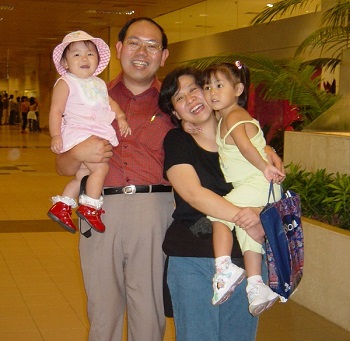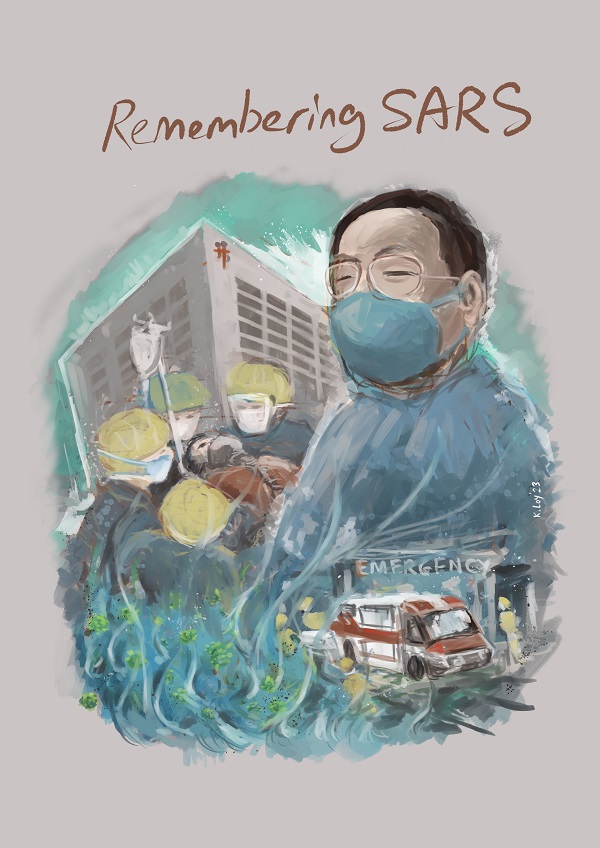20 years ago, the SARS outbreak swept through the globe, infecting over 8,000 people and claiming nearly 800 lives. In Singapore alone, 238 people were infected and 33 lives were lost. Through the unwavering efforts of our healthcare workers (HCWs), SARS was eradicated from Singapore. In this snippet series, we share in doctors' remembrances of that harrowing period and commemorate the sacrifices, bravery and dedication of Singapore's HCWs.
Bertha Woon
I was a surgical ICU registrar at Tan Tock Seng Hospital (TTSH) in March 2003, attending to the medical ICU or cardiac intensive care unit "blue letter" referrals. I had been Dr Alexandre Chao's vascular registrar, before his move to Singapore General Hospital.
Prior to SARS being defined, I was warded in the zinc-roofed Communicable Disease Centre on 20 March 2003, following a phone call asking me to report to the infectious disease (ID) department for my fever. I only had my doctor's tag, Nokia phone and a pen with me. The late Dr Ong Hok Su, a medical officer reporting to my friend, was with me at the time. I had no idea that our wave good night across the glass sliver on our doors was the last time I would see him alive.
I thought medication and sleep would settle my fever and that my ID colleagues were overreacting. Yet after people I knew personally, both only sons, passed away from SARS, I realised that I had been given a second chance at life. I determined to live my best life henceforth, so that I can give a better report of it when I meet my Maker.
The SARS episode made me realise that making time for my parents was my most important priority and I left for private practice. The clincher was when my father said he would love me even if I quit medicine and became a piano teacher, and my mother said my ten-day quarantine was the first time she had spoken with me properly ever since I began doing one-in-three calls with no post-call days off.
Daniel Yeo
I woke up feeling unwell and once fever was confirmed, I checked into TTSH with a sense of dread. This was March 2003. I morphed from doctor to patient, and the ensuing days were a blur. I had contracted SARS while working in the coronary care unit. Although I had pneumonia and was breathless, I was thankfully well enough to remain in the general ward. During my stay, I was informed that my fellow medical officer, Dr Ong Hok Su, had succumbed to SARS. I was shocked and afraid. My two children were still toddlers then, and my wife was also admitted with fever. Thankfully, she was subsequently diagnosed with dengue. I am very grateful to have recovered and be discharged.
In early 2020, there was a sense of deja vu when COVID-19 became a pandemic. Thankfully, the nation already had contingency plans in place and responded quickly and decisively. Patients and their contacts were swiftly quarantined, and the Ministry of Health poured resources into managing the outbreak. The new National Centre for Infectious Diseases that had just been inaugurated in 2019 was also put to good use.
In Gleneagles Hospital where I work at, the hospital management and doctors worked together to protect our patients from COVID-19 and to look after COVID-19 patients as well. SARS in 2003 was over in three months. The COVID-19 pandemic has lasted three years and is still exerting an impact on life in Singapore and across the world. We should remember the sacrifices and lessons of the frontline workers in the SARS and COVID-19 outbreaks, so as to be prepared for the inevitable next outbreak.
Koh Woon Puay
Alex's story of how he died from SARS in April 2003, during the SARS epidemic in Singapore, has been retold in the newspapers, in social media, in Chinese textbooks and even re-enacted in local TV docudramas. While the story of his death epitomises the courage and sacrifice of our healthcare workers, the story of his life epitomises the values that Alex displayed: selfless giving to others, dedication to his calling and his faith in God.
Alex had once told me that, at the end, he did not want to be remembered for what he had said or done, but how he had made others feel. As the saying goes, "Time heals all wounds", but I think time really heals by acting as a filter of pain. In the end, time filters out the pain, the grief and the sense of loss, leaving behind the beautiful memories of how Alex made each of us feel. Every image he has left us with, in every photograph, is the happy smiling face of one who has lived a full life with no regrets, and of one who has had though he passed this way but once, and so briefly, he has touched and shared his love with so many.
I hope for those who have known him personally that as you remember Alex in each of your unique encounters with him, that these memories are fond and happy ones that continue to bring smiles amid the tears.

Always remembered by family as a loving husband and a devoted father
Lee Pheng Soon
20 years later, I have two lasting memories.
The first is the smell of fear.
Doctors know fear. Many recall the visceral reaction the first time we entered the dissection hall as students and saw many (many!) bodies lying on tables waiting for our touch, and then realising that we would have to learn to deal with this fear, otherwise the dream of becoming a doctor would end there.
And so it was with SARS, with its cause poorly understood, the individual clinical progression unpredictable, and the spread unstoppable. True, this infection could come from anywhere and visit anybody, but we knew: healthcare workers were at a far greater risk simply because of our increased exposure. The fear was an invisible miasma that seeped through the best available armour most of us carefully donned. The fear of unknowingly carrying it home in the pre-clinical stage. The fear of eventually hearing "We might need to intubate you soon..." Such fear has a distinct, unforgettable smell. It is not the smell of a corpse; it is more subtle, slightly sweeter and distinctly acidic at the back of the soft palate. It whispers: "Death might come, perhaps even today. For you."
Then one day, one realises that many of our patients smelt the same way, and that even the humblest healthcare worker (such as the trolley attendant or the ward cleaner) also smelt the same. It was slightly different in each, like how Killiney coffee differs from Ya Kun coffee, but undeniably, surrounding each, the smell of the same fear.
And on another day, indistinguishable from the previous, one wakes being less bothered by the smell than the day before. The smell is unchanged in character and intensity, but is somehow less nauseating. After a while, we accidentally overlook it because there was work to do – patients to see, limbs to salvage, even lives to save.
Many of us had adjusted by then: some slept on premises, others in nearby hotel rooms. Others arranged for their families to go overseas for an indefinite period. But we went to work without even thinking of resigning, because this was what we had been trained for. Besides, we rationalised, there was nobody else to do it. Years later, someone would invent a name for this attitude: "Courage".
This then is my second lasting memory: the Courage that stood up. It is not the same kind of courage that can overcome fear, for our Fear never left and never diminished. It is the Courage that stood up alongside Fear, and by some miracle, Courage was slightly larger and taller than Fear. It is the Courage that let us cry when a doctor we knew and loved could not be saved. Large tears silently dropped straight onto our shoes, followed by the same willingness to resume work the next morning.
Thus, 20 years on, I remember two things best: Fear, constant and pungent, and by its side, Courage. Both were present every day till the last patient was discharged. Even then, Fear did not go away, for there was no guarantee that SARS would not return. But we had learnt one thing – Courage would also stay, and for us, Courage was enough because we had learnt that it was bigger and taller than Fear.
SMA News takes this opportunity to pay tribute to the five HCWs who lost their lives to SARS:
- Dr Alexandre Chao
- Dr Ong Hok Su
- Mdm Hamidah Ismail
- Mr Jonnel Pabuyon Pinera
- Mdm Tan Kiew Miyaw
Kevin Loy
